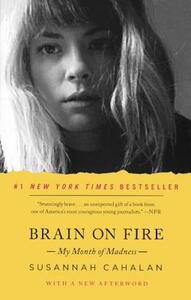Take a photo of a barcode or cover
Brain On Fire started off really interesting but then it kind of fell flat for me. I think it's because the medical jargon was totally lost on me, and once Susannah was in the hospital it all kind of felt rushed. I did enjoy learning a bit more about anti-NMDA receptor encephalitis and this book also caused me to look into my own health a bit more which I think was one of Susannah's intentions when writing it. Overall I just found the material a bit dry and I expected it to be more of a personal memoir with less medical talk, but that's also my own fault for not looking into this one before reading.
This story is terrifying to me. It's real, it's true, and it's as if you're there whilst you're reading it.
I picked this book up as part of the #MHAReadathon which aims to raise awareness of Mental Health conditions and get conversations going about them. I was hoping to like this book, and find out a bit more about Susannah Cahalan, but I was not prepared for how fast I would speed through this (in one day) or how much it would affect me (a lot). I genuinely fell head over heels for Susannah as her writing was SO easy to relate to (I also want to go into publishing etc) and she was so down-to-earth.
Susannah suffered through a month of misdiagnosis. One day she was fine, but within a few days she was so far from fine that she was almost a different person, and with more and more time, she felt herself getting lost to a psychosis she wasn't sure anyone would be able to help her out of. Seeing the decline of such a young, lively individual, and reminding myself it was a true story, was really impactful on me. I found myself completely absorbed, wanting the doctors to figure it out, not wanting her to be lost to this unknown psychosis that no-one could break.
The story within here is told through hospital records, digital diary documents, transcribed video tapes and Susannah's own recounting. I truly felt so much when we hear about the scenes Susannah doesn't remember - the scenes where she felt like someone else was in her body and her brain was afire. This book touched me, scared me, and ultimately will stay with me. I am happy for the resolution and the fact that she's here today to write this book, but it was a close call. If you want to know what I mean - read the book. 5*s
I picked this book up as part of the #MHAReadathon which aims to raise awareness of Mental Health conditions and get conversations going about them. I was hoping to like this book, and find out a bit more about Susannah Cahalan, but I was not prepared for how fast I would speed through this (in one day) or how much it would affect me (a lot). I genuinely fell head over heels for Susannah as her writing was SO easy to relate to (I also want to go into publishing etc) and she was so down-to-earth.
Susannah suffered through a month of misdiagnosis. One day she was fine, but within a few days she was so far from fine that she was almost a different person, and with more and more time, she felt herself getting lost to a psychosis she wasn't sure anyone would be able to help her out of. Seeing the decline of such a young, lively individual, and reminding myself it was a true story, was really impactful on me. I found myself completely absorbed, wanting the doctors to figure it out, not wanting her to be lost to this unknown psychosis that no-one could break.
The story within here is told through hospital records, digital diary documents, transcribed video tapes and Susannah's own recounting. I truly felt so much when we hear about the scenes Susannah doesn't remember - the scenes where she felt like someone else was in her body and her brain was afire. This book touched me, scared me, and ultimately will stay with me. I am happy for the resolution and the fact that she's here today to write this book, but it was a close call. If you want to know what I mean - read the book. 5*s
challenging
hopeful
informative
fast-paced
“Brain on Fire” reads like a medical thriller, only scarier because it’s true. Cahalan turns her harrowing descent into madness into a gripping, unforgettable story that’ll leave you in awe of both her survival and the mysteries of the mind.
challenging
emotional
informative
mysterious
tense
fast-paced
emotional
hopeful
informative
inspiring
sad
slow-paced
Fascinating memoir. Quite the page turner. After reading about what Susannah Cahalan experienced during her medical crises, I appreciate the last few lines of the book which are:
Someone once asked me, "If you could take it all back, would you?"
At the time I didn't know. Now I do. I wouldn't take that terrible experience back for anything in the world. Too much light has come out of my darkness.
Someone once asked me, "If you could take it all back, would you?"
At the time I didn't know. Now I do. I wouldn't take that terrible experience back for anything in the world. Too much light has come out of my darkness.
A scary and necessary confrontation of chronic illness
As someone who has recently done battle to get my own diagnoses and has uncovered chronic illness in the process, I was equal parts excited and nervous for this book, especially since my disorders are neurological in many ways as well.
Susannah does not disappoint. It’s riveting and it’s tragic and it’s scary and it’s hopeful and it’s necessary. She recounts the stories of others who were able to pursue their own diagnosis after reading her story, and it validates why I speak up about my own so much, knowing how many people have come to me and said that they didn’t even know this illness existed until they read a post of mine or something, making them advocate for themselves with their doctors.
It’s scary because it is just a small window into what can happen when your nervous system is, as the title suggests, “on fire.” It occasionally felt like reading into a potential future and it absolutely inspired conversations I needed to have about what happens if I were to experience similar symptoms or see progression in my neurological issues.
(Not ironically, I was also a little bit relieved to see that she found her answers at the same clinical organization I am also a patient at.)
I don’t know that I would recommend this book to everyone, but I do think it’s a scathing indictment that many need to read on our medical system, how busy doctors are and how impersonal medical treatment has become when we make it a for-profit business. The author acknowledges that was fortunate enough to pay for out of pocket expenses being denied by insurance—how many of us are not in that position? How many of us aren’t in a position to be able to truly advocate for ourselves when a doctor gets it wrong, like several of hers did early on? How many of us lack the education or are too sick or too tired to fight a system that won’t listen to us? As someone doing battle with this system for the last several years, I can confirm that it takes a team and it takes a champion that isn’t the patient and it takes so, so, so much strength and endurance to get to a diagnosis finish line for so, so many of us—specialists in my illness, for instance, are notorious for not accepting insurance, placing the burden of expenses and the barrier to a diagnosis back on the patients, who are already sacrificing so much time and expense and commute to get to the answers they need. When someone fucks up my blood tests, I have to carve out another half-day away from work to do those tests; when I have at-home testing done, a half-day goes into returning equipment; when you’re waiting on results or analysis or your doctor to return your message, medication goes missed, symptoms get worse, work gets skipped because you’re not able to complete anything.
The whole thing is a complete fucking disaster, and the patients are the ones who suffer in a system designed for maximum return. Try telling someone who has to wait seven months to see a neurologist that Canadian healthcare isn’t worth it because it takes a long time. Waiting periods are nothing to people with chronic illness, but bearing the weight of both a profit-minded system and the expenses that add up month to month is absolutely an issue.
I suppose that’s my own addendum to the book, although Cahalan does touch on it briefly as part of a central message: How many people suffer because the system is rotten at its core?
As someone who has recently done battle to get my own diagnoses and has uncovered chronic illness in the process, I was equal parts excited and nervous for this book, especially since my disorders are neurological in many ways as well.
Susannah does not disappoint. It’s riveting and it’s tragic and it’s scary and it’s hopeful and it’s necessary. She recounts the stories of others who were able to pursue their own diagnosis after reading her story, and it validates why I speak up about my own so much, knowing how many people have come to me and said that they didn’t even know this illness existed until they read a post of mine or something, making them advocate for themselves with their doctors.
It’s scary because it is just a small window into what can happen when your nervous system is, as the title suggests, “on fire.” It occasionally felt like reading into a potential future and it absolutely inspired conversations I needed to have about what happens if I were to experience similar symptoms or see progression in my neurological issues.
(Not ironically, I was also a little bit relieved to see that she found her answers at the same clinical organization I am also a patient at.)
I don’t know that I would recommend this book to everyone, but I do think it’s a scathing indictment that many need to read on our medical system, how busy doctors are and how impersonal medical treatment has become when we make it a for-profit business. The author acknowledges that was fortunate enough to pay for out of pocket expenses being denied by insurance—how many of us are not in that position? How many of us aren’t in a position to be able to truly advocate for ourselves when a doctor gets it wrong, like several of hers did early on? How many of us lack the education or are too sick or too tired to fight a system that won’t listen to us? As someone doing battle with this system for the last several years, I can confirm that it takes a team and it takes a champion that isn’t the patient and it takes so, so, so much strength and endurance to get to a diagnosis finish line for so, so many of us—specialists in my illness, for instance, are notorious for not accepting insurance, placing the burden of expenses and the barrier to a diagnosis back on the patients, who are already sacrificing so much time and expense and commute to get to the answers they need. When someone fucks up my blood tests, I have to carve out another half-day away from work to do those tests; when I have at-home testing done, a half-day goes into returning equipment; when you’re waiting on results or analysis or your doctor to return your message, medication goes missed, symptoms get worse, work gets skipped because you’re not able to complete anything.
The whole thing is a complete fucking disaster, and the patients are the ones who suffer in a system designed for maximum return. Try telling someone who has to wait seven months to see a neurologist that Canadian healthcare isn’t worth it because it takes a long time. Waiting periods are nothing to people with chronic illness, but bearing the weight of both a profit-minded system and the expenses that add up month to month is absolutely an issue.
I suppose that’s my own addendum to the book, although Cahalan does touch on it briefly as part of a central message: How many people suffer because the system is rotten at its core?
Reading this on the heels of my immunology block but before my neurology block has given me the motivation I need to push through the rest of the school year. It’s also served as a timely reminder that I am on the right career path. Cahalan’s staggering account of her self-described “month of madness” is investigatory, emotional, arresting, and harrowing. I am amazed by the human body and floored by the acute failures of medicine brought about by physicians’ egos. Cahalan caps this book with a critical look at how far we still have to go to understand the human body, especially neurophysiology. In that frame of view, we see that where curiosity should be, there’s an arrogance and ignorance of doctors which causes patients to pay the price of life lost to misdiagnosis, inaccessible treatment, institutionalization, or premature death. This is a prudent reminder for me to humbly approach medicine as an art to practice, not to master.
———————————————————————————
“In the spring of 2009, I was the 217th person ever to be diagnosed with anti-NIMDA-receptor autoimmune encephalitis. Just a year later, that figure had doubled. Now the number is in the thousands. Yet Dr. Bailey, considered one of the best neurologists in the country, had never heard of it. When we live in a time when the rate of misdiagnoses has shown no improvement since the 1930s, the lesson here is that it's important to always get a second opinion.
While he may be an excellent doctor in many respects, Dr. Bailey is also, in some ways, a perfect example of what is wrong with medicine. I was just a number to him (and if he saw thirty-five patients a day, as he told me, that means I was one of a very large number). He is a by-product of a defective system that forces neurologists to spend five minutes with X number of patients a day to maintain their bottom line. It's a bad system. Dr. Bailey is not the exception to the rule. He is the rule.”
“Maybe it's true what Thomas Moore said: ‘It is only through mystery and madness that the soul is revealed.’”
———————————————————————————
“In the spring of 2009, I was the 217th person ever to be diagnosed with anti-NIMDA-receptor autoimmune encephalitis. Just a year later, that figure had doubled. Now the number is in the thousands. Yet Dr. Bailey, considered one of the best neurologists in the country, had never heard of it. When we live in a time when the rate of misdiagnoses has shown no improvement since the 1930s, the lesson here is that it's important to always get a second opinion.
While he may be an excellent doctor in many respects, Dr. Bailey is also, in some ways, a perfect example of what is wrong with medicine. I was just a number to him (and if he saw thirty-five patients a day, as he told me, that means I was one of a very large number). He is a by-product of a defective system that forces neurologists to spend five minutes with X number of patients a day to maintain their bottom line. It's a bad system. Dr. Bailey is not the exception to the rule. He is the rule.”
“Maybe it's true what Thomas Moore said: ‘It is only through mystery and madness that the soul is revealed.’”






